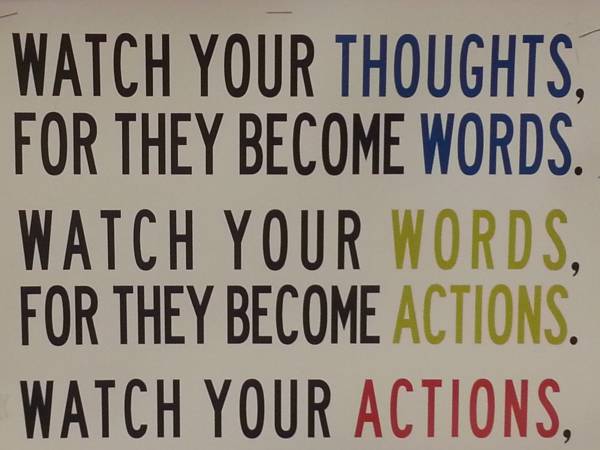Reflecting improves the quality of life

A poster highlights the importance of examining one’s thoughts.
January 17, 2014
Sit down and reflect. Sure, you’ve been told that before. You’ve been told that it’s good to think about life and everything that is occurring. It’ll “help” you. It’ll “improve your life.” All of those are strings of buzzwords that evade the central question—why exactly is reflection important?
Reflection allows us to better understand ourselves. By understanding ourselves, I do not mean realizing that you like chocolate more than vanilla ice cream. I mean the inherent “why” behind everything we believe in, and everything we do. For myself, reflecting allows me to make better decisions. I have a stronger sense of certainty with the direction of my life, and because of that, my decisions and; therefore, my experiences have improved.
Take something simple—in the past few weeks, I have asked myself why I like to punch in underrepresented numbers into the microwave (try it sometime). I came to the conclusion that it is not just the spontaneity involved, but also the delight in playing around with a variety of numbers. Truly, 1:24 is more fun than the plain 1:30.
Okay, that might be a silly example, but other more serious revelations do come about. After reflecting on certain aspects of my life, I came to the conclusion that I detest—not just dislike, but detest—contrived things. I come across anything contrived and I try to run away (yes, figuratively), because contrived actions go against the nature of authenticity. To be myself, I must embrace only what is true, only what I know is authentic. Any activities with motivations not authentic I deem not worthy of pursuing. For instance, I detest studying maniacally for a test with material I do not find interesting, just for the sake of a grade. There are so many other more worthwhile and authentic activities I could be doing instead.
I have talked about why reflection is a critical component of life, now all that’s remaining is how. As in, how in the world do people properly reflect? Good news—there is no one “right” method. For some, it might be a period of meditation, in a room alone, with soothing piano music playing in the background. For others (like me), it might be day-to-day connections, all encapsulated in a journal. I might go on a trip to an art museum, and a particular art piece will spark a curious thought in me.
Later that night, I will sit at home, typing away into my digital journal. As I’m typing, I try to make sense of what happened. I mull over the thoughts gathered during the day. I explain (or try to explain) all the why’s underlying each of those thoughts. I ask myself what was rational and what was irrational. I ask myself what I would have changed throughout the trip, or what I enjoyed the most. Essentially, I make sense of myself, and become more engaged with who I am.
So go ahead and live, live and do what you know to be true to yourself, but take the time out of your day to reflect. Think about life as it is happening. Understand yourself. I guarantee, by knowing who you are (why you do what you do, what you strive for, etc.), you will gain a stronger sense of self. You will know what makes you happy. You will know why what makes you happy, makes you happy. You will blossom into a more authentic person clenching onto a quest of discovering oneself. And all you need to do is reflect.

